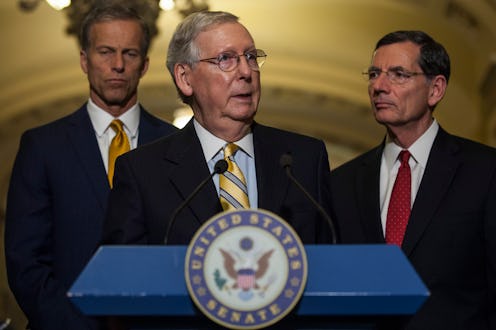News
The GOP Needs A Simple Majority To Open Health Care Debate, But It Won't Be Easy

On Tuesday, Senate Republicans are set to vote on heath care legislation. Many people are closely following the upcoming vote due to its controversial nature, as legislative sparring over health care reform has dominated much of Congress' year thus far. As the vote approaches, many Americans are probably wondering how many votes the GOP health care plan needs to pass — and whether or not the party has enough votes to proceed with the legislation.
Tuesday's vote is actually a vote on whether or not to proceed to open debate on the version of the health care bill that passed the House of Representatives last month, the American Health Care Act (AHCA). If a vote to proceed passes, the Senate can then introduce a host of amendments to the bill, including motions to completely replace the bill with the Senate version of the legislation, the Better Care Reconciliation Act, or to revise the bill to allow for it to repeal Obamacare, but not replace it. Once the amendment process is complete, a final vote would take place on whether or not to actually pass the health care legislation.
On Tuesday, Republican senators will need to secure at least 50 votes in order to open debate on the health care legislation. In this case, only a simple majority is needed to open debate, since Republicans are using the budget reconciliation process to try to pass the health care legislation (in the traditional legislative process, senators need to secure a filibuster-proof 60 votes, but the budget reconciliation process does not allow filibusters). Technically, 51 votes are needed to secure a simple majority; however, in the case of a tie, Vice President Pence will cast a vote, offering Republicans the extra vote that they need to open debate.
Since there are 52 Republican senators, the party can only afford to lose the support of a maximum of two senators if it wishes to open debate on the health care legislation on Tuesday (all 50 Democratic Senators are assumed to be voting against the bill). As the Washington Post reported, this could prove quite problematic for Senate Republicans, as at least four senators have indicated that they oppose the current version of the bill and nine others have expressed concern with some version of the health care bill.
Of course, even if Senate Republicans score the requisite votes to open debate on health care on Tuesday, this does not mean that the legislation has passed. Passage would require another vote after an amendment process and the support of a simple majority, something which is far from guaranteed. Overall, there is certainly a lot of uncertainty as the health care vote approaches and it seems that many people, including the senators themselves, are not quite sure what to expect.